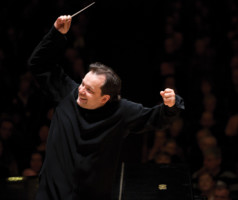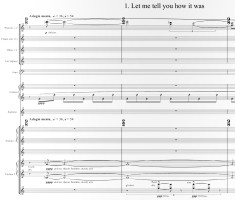Henze, Abrahamsen and Tsontakis with the BSO
|
Grant Chu Covell [February 2016.]
I may have been the only person at Symphony Hall in Boston on a Saturday evening last month (Jan. 30) more eager to hear Henze than the preceding Weber or subsequent Mendelssohn. The audience’s tepid applause didn’t reflect the polished and exciting performance they had just witnessed. I’m sure most of them were unaware that they had it easy: Among Henze’s symphonies, No. 8 is considerably light and upbeat, and furthermore, relatively short. The following Saturday (Feb. 6), I heard Hans Abrahamsen’s luminescent let me tell you. I am not given to superlatives or zeal — just glance around these pages — but the Danish composer’s setting for soprano and orchestra gave some indication that there’s still great music to be written, and even more remarkably, that the Boston Symphony Orchestra might just have a part in creating it. These programs were first and second in a mini-series to commemorate the 400th anniversary of Shakespeare’s death. A crackling Oberon overture began the first evening. I had not yet experienced Andris Nelsons’ work up close. I saw enthusiastic players, and a conductor delighted to be leading them. In these concerts Nelsons didn’t just conduct, but sculpted the air. A detractor could say he gestured as one might when listening to familiar music on the radio. Indeed his habit of leaning upon the podium railing was alarming. I had thought this was the first time I saw Nelsons at the helm, as his style is distinctive. A family member with a far better memory set me straight. I do not remember such physical fluidity in a concert of Harbison, Ešenvalds, Prokofiev and Rachmaninoff from November 2014. However, I admit departing before the Rachmaninoff completed. Perhaps I divulge a closely guarded secret, but even the world’s great orchestras have off days. I had heard the BSO a week before the Weber-Henze-Mendelssohn evening completely slaughter Smetana under an ineffectual guest conductor. Orchestra and conductor were mismatched, let’s leave it at that. Perhaps most audiences — even critics — are deaf to the august ensemble’s potential variability. Under Nelsons they were responsive and warm. They appeared engaged, and delivered subtlety in the Weber and vigor in the Henze. Henze’s Eighth is Romantic with three movements depicting scenes from Midsummer Night’s Dream. Imagine a hyper-caffeinated Berg’s Three Pieces, Op. 6, set in starlit woods with fairies. The ornate music layers deep brass under winds, intersecting with strings and boisterous percussion. The central movement offers a manic dance, the finale a calmer Adagio as the magic fades away. I am certain few in the audience comprehended how good a performance it was. The Eighth contains much of the propulsion of the Seventh as events crest and recede over hectic backgrounds. The underlying story ought to enable easy comprehension. Donkey braying was certainly evident. After intermission, the program wrapped with a semi-staged, multimedia rendition of Mendelssohn’s Midsummer Night’s Dream. Honestly, I had planned to flee after the Henze. The onstage bed and props did intrigue. The ushers also handed out electric tea lights with the instruction that it would be obvious when to activate them. As much as I crave electronics and the intrusion of contemporary shenanigans into traditional fare, I was wary of the gigantic screen and the projected Mendelssohn scrapbook. However, it was good to hear the incidental bits alongside Shakespeare’s words. I was glad to have stayed.
I investigated Abrahamsen’s Schnee (Winter and Winter 910 159-2) a few years ago and its canons did not move me. Let me tell you (2013) is vastly more complex and penetrating. Keeping with the Shakespeare theme, the text is taken from Paul Griffiths’ 2008 novel which uses only the 481 words spoken by Ophelia in Hamlet. What might have been a Dadaist or Oulipo-esque exercise to sustain a book functions effectively as text to be set to music. Barbara Hannigan inhabited the vocal part; the work is dedicated to her. She premiered the role with Nelsons and the Berlin Philharmonic, and this BSO appearance comes just after stateside performances with the Cleveland Orchestra. The role was internalized and intense. Hannigan’s vitality impressed. Abrahamsen asks the violins to be seated antiphonally, a less customary BSO seating arrangement. He also appears further to subdivide firsts and seconds by desk, so that there may be multiple groups of two or four violins at work. Harmonics and stratospheric chords thus glide from stand to stand across the proscenium. As with Schnee, I suspect canonic devices. The orchestration also favors natural tunings and predominantly vertiginous instrumentation. I’ll have to try with the recording (Winter and Winter 910 232-2) but there are passages that would probably cause dogs to snap to attention. We all know what happens to Ophelia. In let me tell you it’s ambiguous whether she is aware of her future. Abrahamsen’s work seems to inhabit the imagined intensity of her last hours. At the work’s conclusion she is about to head out into the snow. Abrahamsen portrays a radiant, enveloping, overwhelming winter. The music simplifies and quiets without losing intensity. Hearing it live was an astounding experience. Necks craned to spy the percussionist rubbing paper against the bass drum. There was an enthusiastic ovation as the audience was clearly moved. Both Abrahamsen and Griffiths were present. The program opened with Shostakovich’s Hamlet which did double thematic duty as an entry in Nelsons’ “Shostakovich Under Stalin’s Shadow” survey for DG. It’s openly satiric, however it nips weakly like a puppy, and is not the most convincing Shostakovich. Decades later Schnittke would perfect this genre. After intermission there were various numbers taken from Prokofiev’s three Romeo and Juliet suites. All the favorite (and loud) moments were there. The Abrahamsen still lingered in the air, making Prokofiev’s acidic force and neoclassicism seem fuddy and insincere. It’s no coincidence that the next day I woke up with Winterreise’s Gute Nacht in my head. Abrahamsen touches the same blanketed ground which Schubert and Müller did. At the work’s conclusion Nelsons commanded nearly 20 seconds of silence, regrettably interrupted by a ringing cell phone. The third and final concert of the series offered the premiere performances of George Tsontakis’ Sonnets, Tone Poems for English Horn and Orchestra. It’s not a concerto, and not a symphony with English horn obbligato. The soloist floats pensively and gracefully across predominantly somber considerations of Shakespeare’s Sonnets Nos. 30, 12, 60 and 75. An orchestral underdog except when exposed in such pieces as Sibelius’ Swan of Tuonela and Wagner’s Tristan und Isolde, few solo vehicles for the instrument have entered the repertoire. The BSO’s own Robert Sheena was stupendous, but I wish we had heard more of him. The orchestral density seemed apt for Shakespeare’s inherent intricacies, although given the other Tsontakis I’ve heard, I suspect the composer will make some adjustments after this week. (Let’s contrast the Henze and Tsontakis: Both can be heady and dense, but Henze more skillfully contrasts different registers and instrumental choirs to ensure variegated layers and distinctive textures and motives. Perhaps it’s a matter of taste as Henze is practically Baroque with his details and crenellations, whereas Tsontakis prefers a more fully defined unfettered line.) I caught the shorter concert of the series (Feb. 12), meant to attract younger listeners with a pre- and post-concert reception, which dropped Dvořák’s Othello overture and wrapped the Tsontakis with Strauss’ Hamlet and Tchaikovsky’s Romeo and Juliet. The grand Strauss intrigued, as it was across the board unfamiliar, just barely hinting at more familiar heroic tone poems. The Tchaikovsky did not fail to impress. To catch a full orchestra swooning is quite a delight. (And yes, a cell phone went off in there someplace.)
[More Grant Chu Covell]
[Previous Article:
String Theory 17: 21 String Quartets]
[Next Article:
An American?]
|

